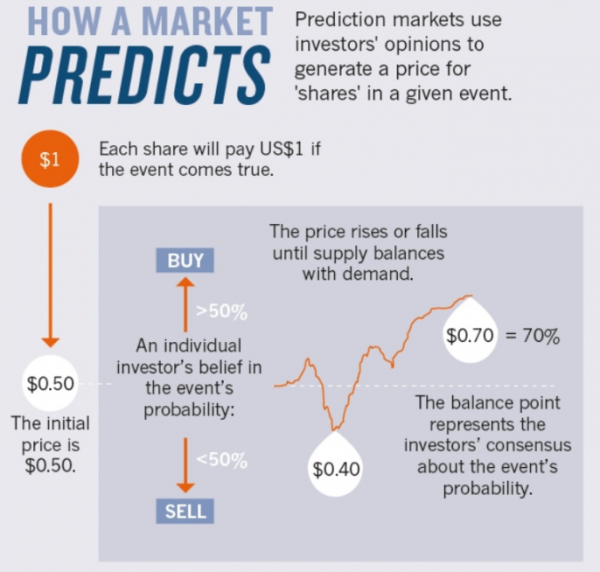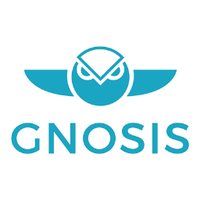Decentralized Prediction Markets: The Opportunities, The Threats, And The Platforms

Might you want to wager on whether Chinese pioneer Xi Jinping will get reelected? Or on the other hand on how beneficial the 2019 Ecuadorian espresso bean gather will be? What about wagering on whether Elon Musk will ever achieve Mars?
Despite the fact that most understand that fortunes won't make you rich, we still especially appreciate to attempt and beat the chances. As indicated by a recent report, the worldwide internet betting industry will contact $1 trillion around the year 2021. That is a considerable measure of cash getting washed on indulgent delights, yet our negative behavior pattern can likewise be utilized for good.
When asking the correct inquiries, betting really gives an approach to create important data in the event that you let individuals wager on true occasions. This is the thing that forecast markets empower, and they're getting to be decentralized.
Forecast Markets
The principal expectation markets were political future markets through which speculators could wager on decision results. They go back to sixteenth Century Italy, and have been flying up in numerous Western nations from that point onward. Gradually came the acknowledgment that these expectation markets could be utilized for wagering on other genuine future occasions, for example, money markets, the estimation of gold, and even the film business. The aggregate entirety of feelings took after by speculations ended up providing exceptionally exact gauges, in this way extremely profitable data.
Besides, forecast markets gave financial specialists an exceptionally helpful instrument for supporting against hazard. For instance, an Indonesian furniture exporter has constrained intends to shield himself from the danger of catastrophic events, for example, woods fires that influence his business. In any case, if he somehow managed to open an occasion ticket for a timberland fire occurring in the coming season and he takes a situation in the "yes" result, he can recover a portion of his misfortunes if a woods fire were to happen. This supporting rationale can be connected to a plenty of certifiable occasions.
Along these lines, an expectation showcase is a market in which individuals can hypothesize on the result of true occasions. As Austrian financial expert Friedrich Hayek depicted it, expectation markets are "instruments for gathering immense measures of data held by people and orchestrating it into a valuable information point."
These helpful information focuses are outlined, for instance, by the Hollywood Stock Exchange, which is a forecast advertise for anything motion picture related. In 1996, 7 out of the 8 top classification victors of the Oscars were effectively anticipated.
In the US, strict betting laws deny expectation advertises that arrangement with genuine cash. Exemptions are Iowa Electronic Markets and New Zealand-based PredictIt, which are partnered with colleges and got a no-activity letter so they could keep working. Other legitimate expectation markets center fundamentally around betting on games and betting diversions, for example, Betfair, BETDAQ, and Smarkets.
How Prediction Markets Work
When somebody puts down a wager on an expectation advertise, that individual truly purchases an offer that speaks to their normal result. For instance, if there were to be a ticket made for the occasion of Bitcoin hitting 10k preceding September 1, you either purchase a "yes" or a "no" offer. The offers can be unreservedly exchanged on the forecast showcase and their rate esteem speaks to the market's opinion about the likelihood of result. The offer esteem is communicated in rates and begins at half/half.
Individuals that trust Bitcoin will go more than 10k purchase "yes" shares, which gradually changes the offer esteem. As more individuals anticipate that Bitcoin will go more than 10k than not, the offer estimation of "yes" surpasses that of "no." If the offer estimation of "yes" is 73%, this implies 73% of the market picked that result (in light of their capital info).
This likewise implies you can get "no" offers at 27%. On the off chance that Bitcoin turns out not to hit 10k preceding September, you can recover the "no" offers with the market producer for $1 every, in this manner $0.73 per share, while the "yes" shares wind up useless.
Source: https://www.nature.com/
By and large, there are three sorts of expectation markets:
Double markets have two result alternatives (Yes/No).
Scalar markets (scope of qualities) have a scope of results. For instance: what will be the market top of Apple on December 31, 2018?
All out business sectors have various choices. For instance: which digital currency will become the most finished the following a half year (Bitcoin, Ethereum, Litecoin, and so forth.)?
Ramifications of Prediction Markets
The offer cost of expectation advertise tickets is free market activity guided by data. The data an individual approaches is just a small amount of the aggregate learning accessible, however the entrance to data of the whole market is relied upon to be a reasonable portrayal of the total of its information. This is the reason the gauges of forecast markets are so important.
This aggregate information is called astuteness of the group, which is the possibility that huge gatherings of individuals come to more exact figures than people or even little gatherings of specialists. The data forecast markets deliver is only that, exclusive shockingly better in light of the fact that there is a monetary benefit to be made. Individuals need to profit through wagering on a result and are in this manner anticipated that would genuinely advise themselves before putting their cash on hold.
The estimates made by forecast markets give significant experiences to a wide range of purposes, for example, assumptions regarding legislative issues, drifts, the result of games matches, and for pretty much whatever else that individuals can think about that we can wager on.
Moreover, expectation markets give anybody access to benefit from venture openings which are not freely accessible, or have hindrances of section, for example, geological areas, controls, or not having the required least capital.
For instance, a Kenyan little time speculator won't approach putting resources into the UK land showcase, however he could open up a ticket anticipating the rising costs of that market and purchase a couple of offers himself. A similar rationale goes at the cost of government bonds, stock costs, file costs, or product costs. Expectation markets can likewise work as customary monetary subsidiaries, enabling members to short resources and to fence themselves against a wide range of money related occasions.
.jpeg)
There are a few entanglements for expectations markets. For instance, a mind-boggling number of forecast markets neglected to effectively foresee both Brexit and Trump. Specialists ascribe these failings to the individual conviction a great many people had about what ought to be the result, making a solid inclination. In addition, specialists surveyed that the forecast markets progressed toward becoming reverberation chambers on account of the absence of assorted feelings of members.
Regardless, legitimately composed expectation markets can be an exceptionally significant source to catch aggregate learning and create precise forecasts.
The most profitable data is created by expectation markets when its members autonomously settle on choices in light of the differed wellsprings of data every individual member approaches. In the event that you have an extensive number of members that meet these necessities, the estimation of an expectation ticket mirrors a precise figure.
Decentralized Prediction Markets
The necessities for the most exact forecast markets, specifically client freedom and secrecy, are normally met through decentralization. There are no focal gatherings included, making the procedure oversight safe and straightforward for all members. It's nothing unexpected then that few ventures have been chipping away at making forecast showcases on the blockchain.
Due to its permissionless nature, open blockchains are genuinely worldwide and anybody can get to them. For an expectation advertise, this takes into consideration a brilliant accumulation of individuals from a wide range of various foundations with access to various wellsprings of data, influencing the collected estimate they to create exceedingly educated.
Besides, individuals can get to these stages namelessly, which means they are obscure to the market. This makes it extremely hard to control singular performing artists, who can in this way come to autonomous choices in view of their very own entrance to data. This diminishes potential inclinations and prompts more precise forecasts.
Also, expectation showcases on a blockchain are naturally straightforward and have appropriated security as a result of the idea of the innovation. There is no corruptible focal or outsider and the intervention procedure of the results is finished by arbitrarily chosen and unknown clients of the stage.
This implies decentralized expectation markets can be control safe on the grounds that there is nobody gathering to apply oversight. Also, there are no expenses for the market creator, just the expenses for making an occasion ticket and the exchange charges of the blockchain the market keeps running on.
The decentralization of forecast markets can, and will, posture genuine lawful difficulties for controllers. Most governments put forecast advertises in either the class of betting or choices exchanging, which are both intensely controlled. On account of the decentralized idea of blockchain applications and installments in cryptographic forms of money, these dapps can get around administrative obstacles and the conventional keeping money framework. On the off chance that an expectation showcase is really decentralized, there is no real way to bring it down.
Since anybody can make an occasion ticket, it is a sensible probability that the most over the top wagers on things, for example, fear based oppression, sedate costs, and deaths will be propelled on the expectation markets. To show the truth of this, the primary death markets have just flown up on Augur.
This will be lawfully unsatisfactory, as this could make money related motivations for unlawful exercises. The stages can be utilized namelessly—in this way, for instance, a boxer could wager against himself and toss a match.
This will be legally unacceptable, as this could create financial incentives for illegal activities. The platforms can be used anonymously—so, for example, a boxer could bet against himself and throw a match.
It also enables easy insider trading. Similar to the Pirate Bay, such a platform could be very hard to take down. Once regulatory attention starts turning towards a decentralized prediction market, we’ll see how decentralized the platform really is and if so, how things will unravel.
But before all this, we first need a decentralized prediction market that is actually live and being used.
An Overview of Current Decentralized Prediction Markets
Similar to the blockchain industry as a whole, existing prediction market projects are still in their early phase. Nevertheless, they have great potential as any competition is either heavily regulated or regulated out of existence, yet prediction markets are popular platforms for users and produce valuable insights.
Prediction markets are complex to create, especially decentralized ones, and the following projects all have their own unique processes.

Augur
Augur has been in the making since 2014, had its ICO in 2015 and launched its platform in July 2018, signalling how difficult it is to create and launch a decentralized prediction market. The team’s vision for the platform is that it will be truly decentralized, and controlled by the community. There is no central organization that receives fees or controls any process on the platform.
Augur runs on Ethereum and is therefore limited to the scalability of this blockchain for now, but it also allowed for the creation of Augur’s native ERC-20 token REP (which stands for Reputation). This token is required for creating event tickets, but also to report on the actual outcomes of events.
These reporters stake REP on their submitted outcome and if correct, the reporters are rewarded with a portion of Augur’s market fees. In the case they report incorrectly, their staked REP is lost.
Maker creators earn from the fees of participants in their events on Augur, so they are incentivized to create popular events. This has already been happening ever since the platform launched, with over 500 events and around $1.5 million at stake just 2 weeks after the platform’s launch.
Augur is the first decentralized prediction market to launch, and is one of the most interesting dapps to watch because it’s one of the first to be actually used. However, it’s a dapp that can seriously conflict with regulations. Time will tell how the platform evolves and what obstacles it will run into, which will set a precedent for other prediction markets and dapps in general.

Gnosis
Gnosis is quite comparable to Augur. The platform will also run on the Ethereum blockchain, and has been in development since 2015. The platform leverages blockchain technology to eliminate middleman fees and risk, and to ensure transparency and censorship resistance.
Gnosis had its ICO in April 2017 during which it raised $12.5 million. The team has indicated they have a more specific focus on particular events, namely prediction markets concerning insurance, information, and financial markets. However, users of the platform are open to create a market for any event they want.
Gnosis is made up of several layers that all support the platform in various ways. Gnosis core is the smart contract framework that enables the decentralized prediction market, the Gnosis application layer allows for both in-house as external applications to expand the platform, while the service layer allows for building applications on top of Gnosis.
There are GNO tokens that are used to generate OWL tokens, which are used to pay for platform, application, and service fees.
One of the key challenges for decentralized prediction markets is the verification of the outcome of events, thus putting external data on the blockchain. For this, oracles are needed, and Gnosis plans to allow external platforms to be used as oracles in some cases.
If these external platforms fall short, Gnosis has the “Ultimate Oracle” solution. This reporting method lets users stake money on the correct outcome. If an outcome is a clear winner, the Ultimate Oracle will return the stakes plus a little to users who staked on the right outcome, while those staking on the wrong outcome lose their funds.
The platform has been testing since 2017 under the name Gnosis Olympia, and several other platform layers have been launched and tested as well. The project is slowly getting its shape, and is continuously being developed and progressed by the sizeable team.

Stox
A lesser-known decentralized prediction market project is Stox. The focus of this project is to bring decentralized prediction markets to the masses. The platform is designed to be easy to understand for people unfamiliar with blockchain and cryptocurrency.
The team behind Stox has already successfully founded a company in 2014, invest.com, a platform on which users can trade a variety of financial products. So far, invest.com reported $50 million in revenue in 2016, and has managed to attract over 3 million users which the team wants to guide to the Stox platform.
The Stox platform and token is Ethereum-based and the team leverages the existing IT infrastructure of invest.com to support the platform’s operations. Stox’s native STX token will be used for opening events and for trading outcome shares.
For oracles, trusted individuals take on the role and are paid STX by the platform for their services. Their verdict on the outcome of an event can be challenged within 24 hours of the resolution. These appeals cost STX, which will be returned to the challengers if they were right. The STX token will be used for all activity on the prediction market dapp.
Stox has indicated that it will be more centralized than its competitors, which will make the platform more efficient but also requires generating trust in the centralized oracles, for example. This centralization of oracles could pose serious problems to the platform as regulations are strict when it comes to prediction markets.
That being said, the platform does have a VISA and Mastercard integration for people who want to buy STX without having to go through exchanges. They also have a serious capital and consumer base from their existing, successful company invest.com.

Bodhi
Bodhi was actually the first decentralized prediction market to officially launch. Bodhi targets the Chinese market and is the first prediction market dapp to do so.
The dapp launched on the Qtum platform on the April 23, making it the first functional decentralized application on Qtum. From the start, Bodhi had two versions of its dapp: the test version on which users can bet with test tokens, and the main version which allowed for real value bets. Both are live.
Bodhi too allows for anyone to create event tickets on any real-world event, enabled by the absence of a central party on the platform. How this will fly in authoritative China remains to be seen, but thus far the decentralized setup of the platform has kept it online.
BOT, Bodhi’s native token, can be used to access all dapp functionalities such as creating events, staking tokens on the event outcome, and participating in the decentralized dispute resolution process.
Concluding Remarks
Prediction markets are generally prone to strict regulations, which the decentralization might undermine. However, most dapps are still created by centralized teams with offices in countries with regulations, so as long as these prediction markets are not truly decentralized, regulatory push backs are to be expected.
Nonetheless, prediction markets are valuable tools for generating accurate forecasting information based on the wisdom of the crowd, for hedging against real-world risks, and as a way for people to make informed bets instead of leaving gambling completely up to chance.
Such prediction markets are scarce, and by decentralizing them, people from anywhere can have access to prediction markets and use the event markets for literally any purpose they like, which will lead to highly interesting, perhaps morally questionable event markets.
Augur’s early success already indicates that there is consumer interest in these prediction markets and is the first major step in bringing these markets for betting on future outcomes of real-world events to the masses. Right now, decentralized prediction markets seem to be heading for a battle between regulation and decentralization.